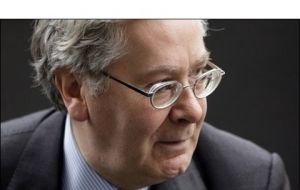MercoPress. South Atlantic News Agency
UK consumer inflation reaches 17-month high in April
 Bank of England Governor Mervyn King: “temporary effects”
Bank of England Governor Mervyn King: “temporary effects” United Kingdom consumer price inflation unexpectedly jumped to a 17-month high in April, 3.7%, driven by big rises in tax on alcohol and tobacco as well as higher prices for women's clothing and food, data showed.
Sterling briefly rose against the US dollar after the data before slipping back, reflecting concerns that potential earlier than expected interest rate hikes prompted by price pressures, added to imminent budget cuts, might derail the economy's recovery.
The Bank of England Governor Mervyn King said temporary factors were largely to blame for the high numbers and that inflation was likely to ease back to Britain's official 2% target within a year, though the pace and extent of that expected fall were “highly uncertain.”
Annual consumer price inflation rose to 3.7% last month, up from 3.4% in March, while the longer-running retail price inflation series hit its highest level in more than 18 years, the Office for National Statistics said. Economists had forecast a smaller increase in CPI to 3.5%.
The strong reading meant BoE governor King was required to write a public letter to new Conservative Chancellor George Osborne to explain why inflation was still more than a percentage point above the government's 2%.
King said higher oil prices, a rise in value-added tax to 17.5% from 15% at the start of the year, and past falls in sterling were driving prices higher, but were only short-term factors that would abate over the coming months.
“The temporary effects of these factors are masking the downward pressure on inflation from the substantial margin of spare capacity in the economy,” he added.




Top Comments
Disclaimer & comment rulesCommenting for this story is now closed.
If you have a Facebook account, become a fan and comment on our Facebook Page!